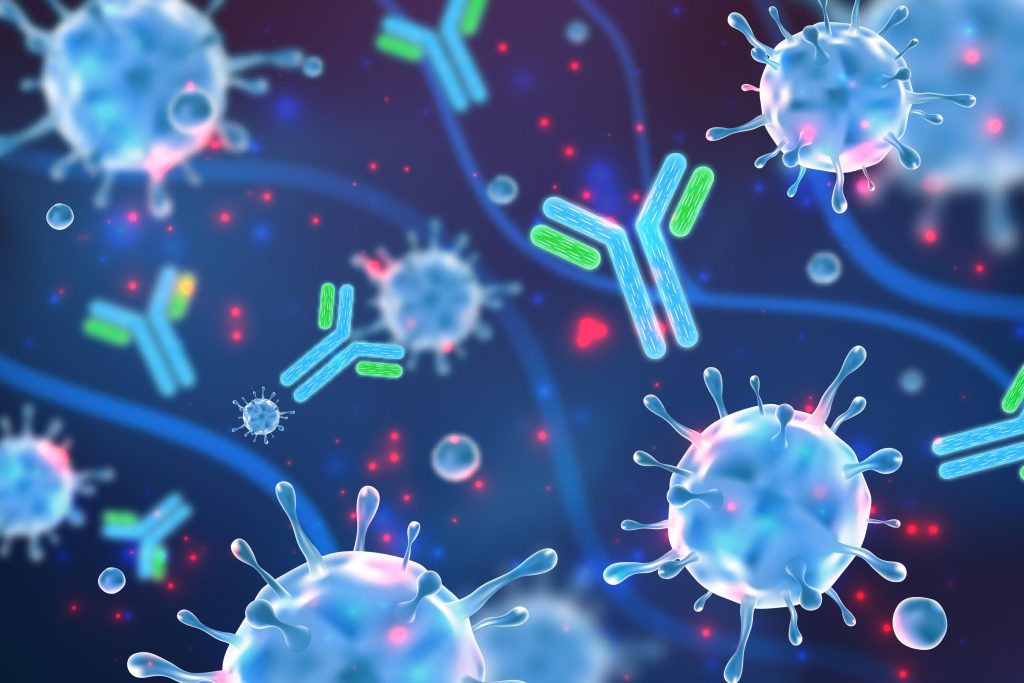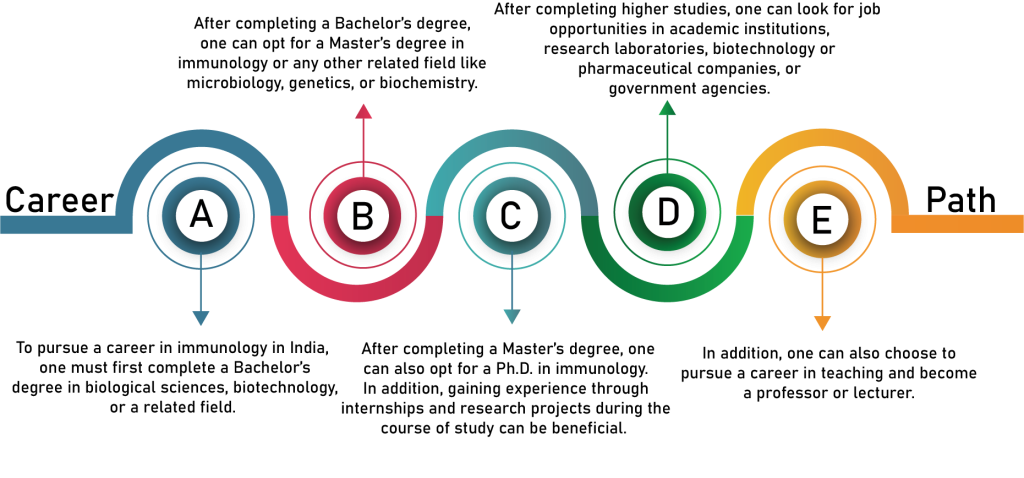Immunology is a branch of biomedical science that focuses on understanding how the immune system protects the body from infectious diseases, cancers, and other harmful pathogens. The immune system is a complex network of cells, tissues, and organs that work together to defend the body against invading pathogens. Immunologists study this system and use their knowledge to develop new therapies, vaccines, and diagnostic tools to prevent and treat diseases.

Work description
Immunologists study the immune system, including how it functions and how it can be manipulated to fight disease.
They may work in a variety of settings, including research laboratories, hospitals, biotechnology companies, and government agencies.
Their work may involve conducting experiments and analyzing data to understand the immune system’s response to different stimuli or developing new therapies and vaccines.
They may also work with patients to diagnose and treat immune-related disorders or work on public health initiatives to prevent the spread of infectious diseases.
High Demand
Opportunity to make a positive impact on public health.
Lucrative salaries
Work on cutting-edge research and develop new therapies and vaccines.
Opportunities for innovation
Continuous learning and intellectual challenge.
Versatility
Opportunities for specialization and career growth.
Flexibility
Good earning potential.
Job satisfaction
Collaborative work environment.
High stress
Long hours and demanding workloads.
Long hours
Competitive job market for advanced positions.
Competitive field
Need for continuous education and staying updated with the latest research.
Constant learning
Risk of exposure to infectious diseases or hazardous materials in the lab.
Isolation
High-pressure work environment with strict deadlines and funding constraints.
Eye strain and other physical health issues
Limited job opportunities in some geographic locations.
The cost of pursuing a career in immunology in India can vary depending on several factors such as the level of education, type of institution, and location.
For a bachelor’s degree in immunology, the tuition fees for a three-year course in a government college in India can range from around INR 20,000 to INR 1 lakh per year. Private institutions may charge higher fees. Additionally, there may be other costs such as accommodation, textbooks, and laboratory fees.
For a master’s degree, the fees can vary widely from INR 50,000 to INR 5 lakhs per year depending on the institution and program.
For pursuing a PhD in immunology, students may be eligible for a fellowship which covers tuition fees and provides a stipend for living expenses. The amount of stipend can vary based on the funding agency and institution.
[wpcharts type=”horizontalbarchart” bgcolor=”red:gray:yellow,blue:gray:yellow,random:gray:yellow,purple:gray:yellow” min=”0″ legend=”true” titles=”2 year , 5 year” values=”3,7,5,12″]
The earning potential for immunologists in India varies based on their education, experience, and job title.
Entry-level positions typically pay around Rs. 3-5 lakhs per year, while experienced immunologists can earn upwards of Rs. 15-20 lakhs per year.
Those working in the pharmaceutical and biotechnology industries generally earn higher salaries than those in academic or government positions.
[wpcharts type=”horizontalbarchart” bgcolor=”red:gray:yellow,blue:gray:yellow,random:gray:yellow,purple:gray:yellow” min=”0″ legend=”false” titles=”Entry-Level, Mid-Career, Senior-Level ” values=”5,15,25,35,45,55″]
Students should have a solid foundation in biological sciences, including cell biology, genetics, and molecular biology.
Immunology involves complex and intricate systems that require a high degree of analytical and problem-solving skills.
Students must be able to evaluate scientific literature and assess the validity of hypotheses and experimental findings.
Students must be able to meticulously follow protocols and ensure accuracy in their work.
Students must be able to convey their findings and explain complex concepts to both scientific and non-scientific audiences.
Students must be willing to persist through setbacks and failures and maintain motivation.
Lack of patience and persistence
Poor attention to detail
Poor attention to detail
Inadequate problem-solving skills
Weakness in scientific writing and communication
Inability to handle high-pressure situations and setbacks
Inadequate knowledge of biological sciences
Work-life balance
The work-life balance of someone in immunology can vary depending on their specific job duties, employer, and personal preferences.
Immunology can be a demanding career, requiring long hours and high attention to detail. For example, researchers may need to conduct experiments that require overnight observations or analyze data that takes several hours to complete.
Immunologists may work in a variety of settings, such as research laboratories, hospitals, biotech companies, or government agencies. Each work setting may have a different schedule, but many employers offer flexible work arrangements, to promote work-life balance.
In summary, work-life balance for someone in immunology involves finding a work schedule that works for the individual, managing job demands, prioritizing personal time, prioritizing mental health, and creating a supportive work environment. By balancing these factors, individuals in this field can pursue their career while maintaining a fulfilling personal life.

Immunology has a significant impact on public health in India and around the world.
Immunologists are at the forefront of developing new therapies and vaccines to treat and prevent infectious diseases.
They also play a crucial role in diagnosing and treating immune-related disorders, such as autoimmune diseases and allergies.
As the global population continues to grow and face new health challenges, the demand for skilled immunologists in India is likely to increase.
As immunologists, individuals can work on developing new therapies and treatments for diseases such as cancer, autoimmune disorders, and infectious diseases.
Pursuing a career in immunology can be highly rewarding and fulfilling, as it allows individuals to make a positive impact on human health and contribute to the advancement of medical science.
Clinical Immunology
A specialization that focuses on diagnosing and treating immunological disorders such as allergies, autoimmune diseases, and immunodeficiency diseases.
Immunogenetics
The study of genetics and its relationship to the immune system.
Immunotherapy
A branch of immunology that involves using the body’s own immune system to fight diseases such as cancer and infections.
Immunotoxicology
The study of the adverse effects of toxic substances on the immune system.
Vaccine Development
A specialization that focuses on developing vaccines to prevent and control infectious diseases.
Conclusion:
In conclusion, immunology is a rewarding career path for those interested in biomedical science and public health in India. With the potential to earn a good salary, pursue advanced degrees, and make a significant impact on society, it is a field worth considering for those with a passion for science and medicine.



